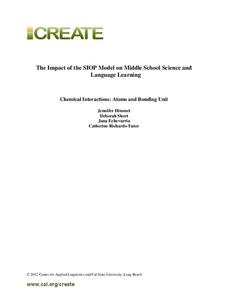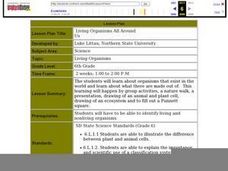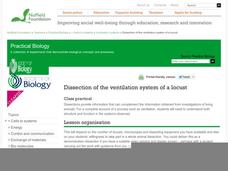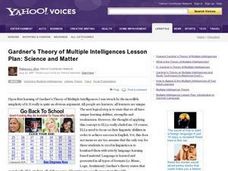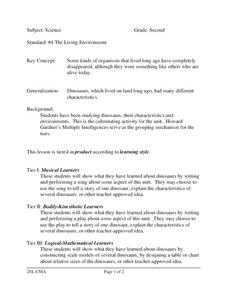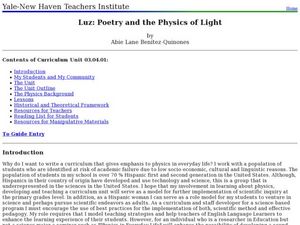EduGAINs
Go H2O! Investigating Residential Water Systems
Before your learners excuse themselves to get a drink at the water fountain, prompt them to think about where that water comes from. A middle school science lesson encourages groups to research their community's source of drinking water,...
Center for Applied Linguistics
Chemical Interactions: Atoms and Bonding
Watch budding chemists interact with the resource on chemical interactions. In the unit, six lessons provide an overview of basic chemistry, from understanding the development of atomic theory to distinguishing between ionic and covalent...
Lerner Publishing
Meet the Dinosaurs
Take your class of youngsters on a prehistoric adventure with this four-lesson series on dinosaurs. Accompanying the Meet the Dinosaurs books by Don Lessem, these lessons engage children in writing their own dinosaur books,...
Curated OER
Ancient Refuge in the Holy Land - International Phonetic Alphabet
Students research the uses and symbols of the International Phonetic Alphabet. They complete a worksheet to translate and transcribe phrases of English into the International Phonetic Alphabet.
Curated OER
A Discourse on the History of Language
Analyze and make inferences from the information used by linguists to construct the evolution of languages. They research different dating techniques to explain how scientists infer age with evidence.
Curated OER
Hubris Lesson Plan
Bring this lesson plan on hubris to your short story unit. After reading Jack London's "To Build a Fire," young readers discuss the role of hubris in the protagonist's death. The lesson plan has connections to other short stories, such...
Curated OER
Living Organisms All Around Us
Sixth graders study organisms that exist in the world and what they are made up of. They participate in a nature walk, a presentation, a drawing of an animal and plant cell, draw a ecosystem, and fill out a Punnett square.
Curated OER
Designing Experiments - Procedures for Teachers
Young scholars evaluate a hypothetical experimental design and attempt to improve upon it. In this scientific method lesson, students are presented with an experiment and are instructed to determine its flaws. They conduct their own...
Nuffield Foundation
Dissection of the Ventilation System of a Locust
Jiminy cricket! If you find yourself plagued by fear of dissection, these locust respiratory system dissection directions will walk you through everything you need to know. Teens inspect a living locust to begin with, then jump over to...
Lerner Publishing
Teaching Habitats
What makes up a habitat? Use this resource to engage first graders in the exploration of desert, wetland, forest, and ocean habitats. Youngsters classify plants and animals into the four distinct habitats through drawings and cutting and...
Curated OER
Science and Matter: Multiple Intelligences
Students complete presentations of their understanding of the concept of matter in many different forms. In this matter lesson plan, students use whatever multiple intelligence they feel strongest in to present their presentation.
Curated OER
What is the Function of Each Seed Part in the Growth of a Plant
Sixth graders investigate the parts of a seed by using a digital camera. In this botany lesson, 6th graders plant their own seeds in class and demonstrate the necessary attributes for growing a plant. Students utilize a...
Curated OER
Science Observations
First graders investigate change by analyzing a photograph. For this scientific observation lesson, 1st graders view a photograph of a baby and attempt to memorize the details. Student view the photo a few minutes later, trying to...
Curated OER
Dig In
Students explore harvest festivals. For this harvesting lesson, students view photos of Christian harvest festivals and Jewish harvest festivals. Students plan a harvest festival within their own school.
University of North Carolina
Anthropology
Anthropologists ask the question that everyone wants answered: what does it mean to be human? An online handout provides a brief introduction to the study of anthropology and outlines three common types of anthropology writing...
University Interscholastic League
English Lesson to Prepare for UIL Spelling and Vocabulary Contest
"i before e. . ." Spelling is easier if kids know the eight basic spelling rules contained in this resource packet.
Blake Education
Harry Potter and the Philosopher’s Stone
The motto for Hogwarts School of Witchcraft and Wizardry warns that one should never tickle a sleeping dragon, but learners will definitely be tickled by the activities in a packet of materials designed to accompany a reading of the...
Curated OER
Will It Sink or Float?
Learners conduct a science experiment to determine whether a variety of objects will sink or float. They discuss the concept of density, and then make predictions about whether the objects will sink or float. They then conduct the...
Curated OER
"If you build it..."
Students utilize prior knowledge to erect and assemble a building from a drawing using spaghetti noodles and marshmallows. In this building lesson, students visualize a three dimensional structure from looking at a picture and converting...
Curated OER
Shake, Rattle, and Roll
Students make an earthquake simulator and test their structure to see if it lasts through the earthquake. For this earthquake lesson plan, students make a structure and test and record the results from an earthquake simulator made out of...
Curated OER
The Living Environment
In this reading comprehension lesson, 2nd graders have the choice between musical, kinesthetic, logical mathematical and verbal linguistic options to display their knowledge. Students can write a song, perform a play, construct a model...
Curated OER
Chemical Interactions
Students perform scientific investigations to observe chemical reactions. In this chemical reaction lesson plan students read a passage and identify the cause and effect.
Lerner Publishing
Living or Nonliving
It's alive! Or is it? Through a series of shared readings, whole class activities, and independent exercises children explore the difference between living and non-living things, creating a pair of printable books...
Curated OER
Luz: Poetry and the Physics of Light
Students explore color, light, refraction and reflection. In this light instructional activity students measure solar position and compare it to time.



